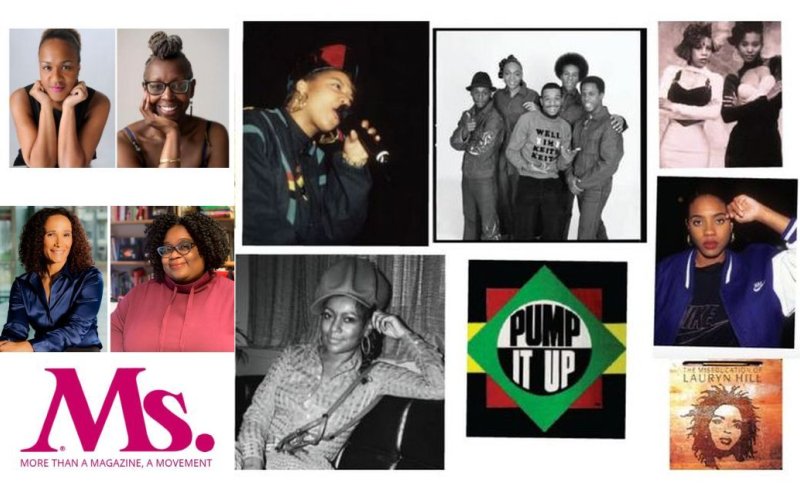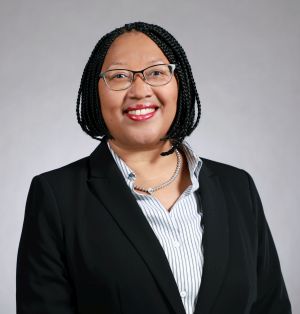Hobson Writes About 50 Years of Women In Hip-Hop in a Ms. Magazine Series

ALBANY, N.Y. (Aug. 8, 2023) — The origin story of hip-hop begins on Aug. 11, 1973, with the iconic sound emanating from a community party in a Bronx rec room. The music was provided by Clive Campbell, known as DJ Kool Herc, but the party was dreamed up and hosted by his sister Cindy. So from day one, women have been major forces in the music genre — making, sharing and shaping the music and the culture around it.
Janell Hobson, professor in Women’s, Gender & Sexuality Studies, brings this history to light in a series on women in hip-hop she wrote and edited for the magazine Ms. “Turning 50: Looking Back on the Women in Hip-Hop,” includes interviews with feminist scholars, professors, playwrights, DJs and music executives, as well as a syllabus and playlist.

“The series began as an idea in a graduate seminar,” Hobson explained. “One of my students, inspired by the work students did in my research seminar the previous year in creating a public syllabus for the Ms. Tubman 200 project, suggested we do a 50th-anniversary project for hip-hop. That’s how we focused on creating a hip-hop syllabus, accompanied by interviews and a playlist.”
Hobson’s series includes an article on hip-hop’s move from the North to the South, and how Southern culture influenced the genre. “Hip-hop started in New York but it didn’t end there,” Regina Bradley, an author and professor who researches the Black American South, tells Hobson. “You probably wouldn’t have a robust hip-hop scene today without the Southern sound.”
Also included in the series is a conversation with journalist and musician Dee Barnes, who was one half of the rap duo Body and Soul, as well as interviews with two scholars of hip-hop feminist studies: Tricia Rose, professor of Africana studies at Brown University and author of Black Noise: Rap Music and Black Culture in Contemporary America; and Gwendolyn Pugh, professor of women’s studies and rhetoric at Syracuse University and author of Check it While I Wreck it: Black Womanhood, Hip-Hop Culture, and the Public Sphere.
An article on women as “hip-hop’s culture bearers” features Elaine Richardson, a professor of literacy studies at Ohio State University, and UAlbany’s Kyra Gaunt, an ethnomusicologist and assistant professor of music and women’s, gender and sexuality studies. Gaunt is the author of The Games Black Girls Play: Learning the Ropes from Double-Dutch to Hip-Hop.
“The girls’ game songs were a serendipitous find at an ethnomusicology conference,” she tells Hobson. “I heard two girls playing hand-clapping game songs. It was at the end of the conference and it just snagged my ear, dragged me down the hallway, and I thought, ‘This sounds like hip-hop!’ They’re mixing beats, the chants they sampled between hand-clapping games, cheers and Double-Dutch.”
While the series focuses on the role of women in hip-hop, it also dives into the entrenched misogyny in the entertainment industry and in world culture. Several of Hobson’s interview touch on whether the genre has truly opened up to women or improved in its representation of women.
“I wouldn’t say that it has improved, because improving would be diversification; not just pretty images, but not just upright respectability politics either,” Rose said. “I want a range of self-possessed narratives and many more women. So, the narrowness of content, the few numbers of women involved, the fact that they are far more about what they look like than what they’re saying as artists, all of that feels pretty much the same to me.”
Hobson said the series will end with an interview and podcast with music producer, writer and activist Drew Dixon.
“Her experience, as a Def Jam label executive who discovered legendary talents for hip-hop and worked on amazing hip-hop masterpieces, cements her status in the history of hip-hop,” Hobson said. “But like so many women, she was chased out of the industry due to sexual assault and sexual harassment — a reminder of how women’s contributions to hip-hop represent both a celebration and cautionary tale. Fortunately, the conversations around hip-hop feminism that this series highlights have made interventions for us to have these stories told.”




